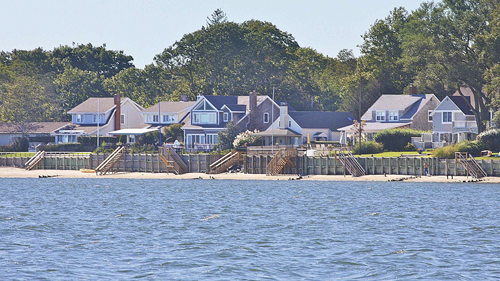Assemblyman floats new water quality bill for Long Island

New construction and any big renovation projects on Long Island would need more modern waste treatment systems installed to better filter nitrogen from reaching ground and surface waters.
Registered pesticides that appear in groundwater in “multiple clusters” would be “prohibit[ed] for use.”
And, starting in 2017, no one would be allowed to repair cesspools in certain “priority areas,” of Nassau or Suffolk Counties. Those people would instead have to install denitrification systems.
These are just a few of the restrictions outlined in a new water quality control measure touted by state Assemblymen Robert Sweeney (D-Lindenhurst), during a conference put on by Long Island Clean Water Partnership advocacy groups in Islandia Thursday.
The bill, known as the “Long Island water quality control act,” comes just five months after a prior legislative proposal with a similar goal for cleaning up Long Island’s ground and surface waters was introduced.
But that bill was met with much criticism stakeholders.
Mr. Sweeney said this new bill comes as response to some of those concerns.
“Part of the issue here and the problem has been the multitude of jurisdictions that have interest or authority in this,” he said. “We only have one underground system [from which to draw fresh water] and there are multiple entities that tap into it and depend up on it. Trying to appropriately balance those concerns has probably been the trickiest part of the process.”
The new proposal brings with it significant changes when compared to the prior legislation, including outlining specific regulations to be put into place over time and giving the state Department of Conservation mandated responsibilities in terms of water quality management, according to the bill.
It also calls for taking a broader look approach at tackling water quality issues, and includes a proposal on restrictions for the use of pesticides and how they are applied — the earlier bill hadn’t mentioned pesticides — as well as the formation of an authority charged with overseeing just how much water is actually being taken from the aquifer, something no regulatory body is currently responsible for.
The new proposal also does away with a highly criticized measure included in the initial legislation that would have given the state zoning authority over local municipalities.
Mr. Sweeney said the legislation would help safeguard water supplies through a variety of different approaches.
“We require more hazardous waste collection days, with DEC funding,” he said. “We provide for more information on water use reporting, and we do give DEC some responsibilities, which I think is logical in regard to developing water quality criteria and managing water quality long term.”
There are some questions as to what areas, exactly, would be considered priority zones, as the legislation refers to a “priority sewering area,” however Mr. Sweeney said those areas have not yet been established.
Pick up the May 29 edition of the News-Review for more information.


